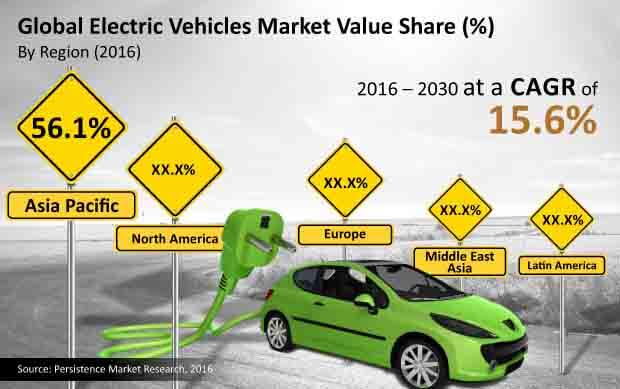Electric Vehicles Market Segmented By Hybrid Electric Vehicles, Plug-In Hybrid Electric Vehicles, Battery Electric Vehicles Technology with Stored Electricity, On Board Electric Generator Power Source in Passenger Cars, Commercial Vehicles, Two Wheelers
Industry: Automotive & Transportation
Published Date: December-2016
Format: PPT*, PDF, EXCEL
Delivery Timelines: Contact Sales
Number of Pages: 200
Report ID: PMRREP2843
The global electric vehicles market is estimated to exhibit stellar growth by the end of 2030. The rise in the promotion of electric vehicles by different governing authorities plays a huge role in driving this growth. The growing awareness regarding the impact on the environment from the emission of conventional vehicles bolsters the growth of the market. The global efforts towards encouraging electric vehicles for mass transit plays a vital role in the growth of the landscape.
COVID-19 pandemic has halted production and manufacturing in the automobile sector which is inversely influencing the electric vehicles market. With relaxation in such activities, the market is expected to attain its desired growth rate.
Developed and rapidly developing economies are generating a plethora of revenue prospects for the manufacturer owing to favorable government regulations and initiatives. Regions including North America, Asia Pacific, and Europe are expected to stay at the forefront in the market by the end of the forecast period.
Manufacturers are exploring opportunities in different types of vehicles including hybrid and plug-in hybrid types of electric vehicles. Major automobile manufacturers are heavily investing in the market to strengthen their position. Established players profiled in the market include Nissan Motor Corporation Ltd., Ford Motor Company, General Motors Company, and Daimler AG.
Electric vehicles are self-propelling transportation machines for passengers as well as goods utilizing the power stored in the batteries via electric bicycle motors or with the help of both internal combustion engine and electric motors working in tandem. Electric vehicles are considered to be the vehicles of the future and are highly likely to make conventional vehicles obsolete.
The global electric vehicles market is projected to grow at an impressive CAGR of 15.6% in terms of revenue generated over the forecast period from 2016 to 2030, primarily driven by the growth of eco-friendly alternatives considered for transportation.
The growth of electric vehicles market is attributed to the ever increasing production and sales of automobiles. Vehicles are becoming an increasingly affordable commodity owing to the growing disposable incomes across the world.
Though the percentage share of electric vehicles market in the automotive industry is extremely small in the current scenario, it is highly likely to expand at a faster rate than expected due to rise in fuel prices owing to higher current usage and growing rate of depletion, the government regulations to reduce the amount of greenhouse gases emitted by vehicles, high fuel efficiency offered by the electric vehicles and soundless operation of the electric vehicles.
Another important factor which is pushing the surge of electric vehicles market is the attractive incentives provided by the governments of various countries with a motive to push the sale of electric vehicles. Customers are offered benefits such as tax exemption, reduced selling prices, and free charging of electric vehicles at various charging points.
Though electric vehicles have proven to be advantageous over conventional vehicles, the market is not without restraints hindering the growth of the market over the forecast period. Electric vehicles come along with a high price tag which might evoke customer apathy towards this market.
Scarcity of charging points within major cities is a massive hurdle in the growth of the global electric vehicles market. The electric vehicles lack alternate source of fuel which often put the schedule of the commute in jeopardy. The complete drainage of the battery can stall the car and can put the traveler at risk. These loopholes in the electric vehicles are a major drawback for the market.
Electric vehicles provide excellent torque at low speeds but its performance drops at higher speed in comparison with conventional vehicles, this difference in performance can also act as a restraint to the growth of the global electric vehicles market.
On the basis of technology, the electric vehicles market is divided into hybrid electric vehicles, plug-in hybrid electric vehicles and battery electric vehicles. Though plug-in hybrid electric vehicles hold the least amount of share in the market, it is projected to grow at the fastest rate with a CAGR of 17.9% in the forthcoming years owing to higher flexibility in terms of its usage.
Passenger cars, commercial vehicles, two wheelers, and others comprise the vehicle type segmentation. In terms of volume, two wheelers segment to dominate the market due to astonishing rise of sale in China. Passenger cars segment is predicted to expand at a CAGR of 15.1% within the forecast period.
Battery powered electric vehicles do not follow the system architecture of parallel hybrid, series hybrid and combined hybrid, which make up the powertrain segment. Hence, this segment excludes market volume numbers of battery electric vehicles leaving the market value far less than the overall market value. Parallel hybrid powertrain is currently dominating the market and is also projected to grow faster than series and combined hybrids with a CAGR of 16.8% till 2030.
The use of electric vehicles is highly prevalent in North America, Europe and Asia Pacific regions. Well developed and extensive charging infrastructure along with the incentives provided by the governments of these regions are expediting the growth of the electric vehicles. In contrast, Latin America and Middle East & Africa regions show a slower adoption of electric vehicles owing to the availability of flexible fuel.
Latin America is projected to create a total incremental $ opportunity of US$ 1,332.6 Mn between 2016 and 2030. The segment is expected to account for 0.3% share of the global market absolute $ incremental opportunity during the same period.
Nevertheless, these regions will show growth in the market for electric vehicles although on a slower note.

Almost all the major manufacturers of automobile with a global reach have manufactured and supplied electric vehicles. Honda Motor Co., Ltd., Toyota Motor Corporation, Tesla Motors, Inc., Ford Motor Company, Nissan Motor Corporation Ltd., Bayerische Motoren Werke AG are some of the prominent companies engaged in the manufacture of electric vehicles releasing hybrids, plug-in hybrids or pure battery electric vehicles variants.
| By Technology |
|
| By Power Source |
|
| By Vehicle Type |
|
| By Powertrain |
|
| By Region |
|
To know more about delivery timeline for this report Contact Sales
